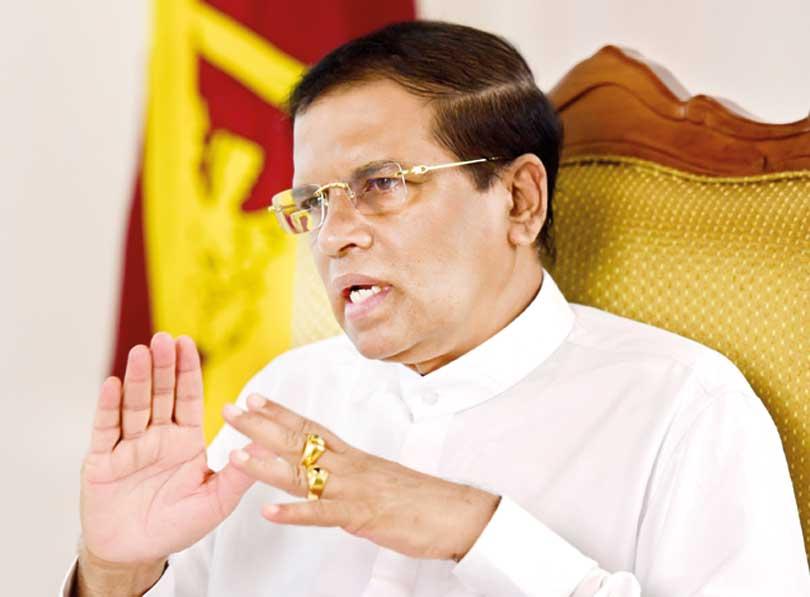06 Mar 2019 - {{hitsCtrl.values.hits}}

Usually, when everyone is telling you that something is a bad idea, it is good advice to take a pause and reconsider.
 This is precisely what the response to President Sirisena’s plans to resume executions in Sri Lanka after a 43-year hiatus should be. His plans to execute prisoners on death row for drug-related crimes have met with fierce opposition from all quarters. The Human Rights Commission of Sri Lanka has categorically recommended to “do away” with his plans to reinstate the death penalty. Leading Buddhist monks have highlighted the incompatibility of President Sirisena’s staunch Buddhism and the desire to hang prisoners. The Catholic Bishops’ Conference have signed a statement calling for rehabilitation, not death for defendants.
This is precisely what the response to President Sirisena’s plans to resume executions in Sri Lanka after a 43-year hiatus should be. His plans to execute prisoners on death row for drug-related crimes have met with fierce opposition from all quarters. The Human Rights Commission of Sri Lanka has categorically recommended to “do away” with his plans to reinstate the death penalty. Leading Buddhist monks have highlighted the incompatibility of President Sirisena’s staunch Buddhism and the desire to hang prisoners. The Catholic Bishops’ Conference have signed a statement calling for rehabilitation, not death for defendants.
Amnesty International has made it clear that resuming executions will knock off Sri Lanka’s human rights leadership in the region. The International Commission on Jurists has called it an “egregious violation” of Sri Lanka’s international human rights commitments.
Amnesty International has made it clear that resuming executions will knock off Sri Lanka’s human rights leadership in the region. The International Commission on Jurists has called it an “egregious violation” of Sri Lanka’s international human rights commitments
In the context of recent trade discussions, the European Union has also urged Sri Lanka to maintain its hiatus on executions with a view to abolish the death penalty entirely.
Even Sri Lanka’s Ministry of Health correctly pointed out in billboards that the death penalty should be reserved for dengue mosquitos, and not human beings.
Perhaps he would do well to look at the death penalty itself. It is the ultimate cruel, inhuman and degrading punishment. It is a lopsided and violent act that predicates itself on principles of vengeance – which can never be a precursor to justice.
Memories of executions in Sri Lanka are vague, if not completely non-existent. He would do well to not resuscitate them for those who do recall the horror.
The use of the death penalty for drug-related offences violates international law and standards. That the death penalty does not have a unique deterrent effect is well-documented and well-recognized. The fact that the death penalty for drug-related crimes is even less effective is beginning to be reflected in criminal justice systems all over the world.
In Iran, ranked as one of the most prolific executioners in the world, Mohammad Baqer Olfat, Iran’s deputy head of judiciary for social affairs, conceded in 2016, “The truth is the execution of drug smugglers has had no deterrent effect.”
Sri Lanka is no exception. Problems associated with the use of drugs will not diminish because of 13 executions. If President Maithripala’s intention really is to protect people in Sri Lanka from the risks of drugs, then he must recognize this. Responding to the health and public security challenges that drugs pose is a much more long-term process. It requires addressing the root causes that lead people to engage in the drug trade. It requires time and from the rapid pace with which the President is trying to resume executions, one can be forgiven for assuming he thinks he has none.
And perhaps in the year leading up to elections, he does not waste any. The results he wants need to be quick and loud.
President Sirisena has looked to the anti-drug policies of the Philippines to guide this vociferous support of the death penalty. The only inspiration that President Rodrigo Duterte’s model should draw is exactly what not to do.
Perhaps then, the President should widen his gaze to include countries that do actually carry out the death penalty for drug-related crimes. A Malaysian citizen, Prabagaran Srivijayan was sentenced to death in Singapore in 2014 for drug trafficking.
Problems associated with the use of drugs will not diminish because of 13 executions. If President Maithripala’s intention really is to protect people in Sri Lanka from the risks of drugs, then he must recognize this
Prabagaran Srivijayan’s legal team raised serious concerns about the fairness of his trial, including the authorities’ failure to follow up leads and call on key witnesses that would corroborate his version of events. Despite this, Prabagaran was executed in July 2017.
A Pakistani citizen, Zulfiqar Ali, languished on death row in Indonesia for 12 years on drug charges. During his interrogation, he was denied the assistance of the lawyer and was kept in a house for three days and punched, kicked and threatened with death unless he signed a self-incriminating statement, which he later did. He required stomach and kidney surgery due to damage caused by the beatings. He received limited translation assistance throughout his detention and during the proceedings against him.
Despite that, execution warrants were issued for him in July 2016. He was saved at the last minute after the government ordered the review of his and nine other cases– but died waiting for the outcome of this review.
When President Maithripala signs those execution warrants, he must take time to consider the weight of what he’s doing. Sri Lanka is recovering from a debilitating war. She has seen mountains of corpses on her streets and shores. Adding 13 more will be the unnecessary death toll that will make few drug kingpins pause.
That is why President Sirisena must.
30 Nov 2024 1 hours ago
30 Nov 2024 2 hours ago
29 Nov 2024 29 Nov 2024
29 Nov 2024 29 Nov 2024
29 Nov 2024 29 Nov 2024